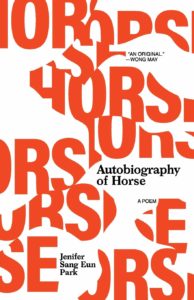Jenifer Sang Eun Park’s Autobiography of Horse is a 76-page poem about a fractured hero’s journey, splattered with the dirtiness of obsession. The book incorporates a variety of forms, including lyrical prose, imagined textbook excerpts, and haphazardly cropped photos, among others. These combined forms result in a sense of mishmashed urgency, of someone leaving her house too quickly to pack neatly. Her luggage is overstuffed and she leaves her keys behind.
The poem’s hero is a woman beguiled by horses. She recounts the history of horses, imagines in lush descriptions what it would be like to be a horse, to speak with a horse. The intense fixation gives a sense of disconcertion, you begin to wonder if the horse is a mask for something else and more personal. We follow our hero through psychiatric visits and pet cremation, but with the omnipresence of the horse, the speaker’s story can be hard to sift through.
Sang Eun Park starts with someone else’s words. A quote from Wallace Stevens, from “The Noble Rider and the Sound of Words.” Through Stevens, Sang Eun Park primes the reader for her jagged horseworld, a “whole heaven” where “imagination lost its power to sustain us. It has the strength of reality or none at all.”
This is an appropriate epigraph. This book plays with reality: the real is interchangeable with the unreal. The two shake hands and switch places so many times, the difference is imperceptible. And as the title would suggest, this book’s favorite real-imagined character is the Horse, who we first meet in a description of a 12th century inaugural ceremony. In this ceremony, the inaugurated king devours a boiled white mare, bathes in her broth, and shares the flesh among “members of the community.” Why? Sang Eun Park doesn’t really get into that, she simply remarks that “the transfer is complete.” This initiates a central motif of “Autobiography of Horse” — that jumbled, unnerving, but mystical relationship between the real human and the (sort of) fake horse symbol.
Horse: When was the last time you had a good sleep?
M: It’s difficult to remember.
H: It’s difficult to remember.
M: It’s difficult to remember.
In this beginning section, Sang Eun Park layers a variety of grotesque horse-related stories in paragraph form. All of these stories are delivered without an inch of tonal horror, or sadness, or pain. They read like wonderfully terrible prophecies (“The horse lives as a forever-cadaver”). We learn of the Jeju horse, whose bones are ground to make arthritis pills (and whose “soul is extracted and manufactured into creams”), we receive a description of “equine self-mutilation,” which is associated with “excitement, stress, boredom, and the scent of poop or piss,” and we hear mention of the Omak Suicide Race, a horse race that causes some horses to “fall and roll to the bottom of the hill.”
These histories seem mostly true, but I wasn’t sure. Either way, I resisted the urge to Google. Throughout Autobiography of Horse, Sang Eun Park says things unambiguously and then colors her words with a twinge of disreality, like in the case of the Jeju horse and its soul. She does this just enough to make you question whether anything she is saying is real at all, or if she’s just fucking with you. Or maybe the horse is fucking with her.
At one point, Sang Eun Park writes, “Sometimes I hear so many hooves, I lose my way back home.” At another point, “I split my own body to carry the horse inside me . . . I see my cavity stuttering . . . I blame myself.” Just as fact intersperses fiction, and vice versa, the speaker’s selfhood is constantly conflated, interchanged, and imprinted upon the image of the horse.
Despite this muddy speaker-symbol relationship, Sang Eun Park’s brutality and small moments of humanity eventually mold the symbol to be in the sole service of the speaker, not the other way around. It’s impossible to ignore the urgency of moments where the speaker abandons the horse, where she leaves the innards of her tantalizingly revolting imagination as leftovers (“George is a good kid. He gets good grades. He doesn’t stay out past nine . . . George masturbates to the children’s cartoon My Little Pony once after school and once more before he goes to sleep”). I feel her humanity when the speaker begins to mention her dog, and the numb pain of asserting that she “needed to watch [her] dog die.” Or when she recounts dreaming about killing her mother, afraid to ever share those dreams. There’s something irrevocably human about fixating on death, dreaming about death. Death pokes a hole into the speaker’s confused self-image. Death lets in a dim, crusted light.
My favorite thing about the words in Autobiography of Horse is how many of them are the word “horse.” Sang Eun Park loves to repeat “horse,” either for multiple lines (“horse horse horse horse horse horse horse horse,” etc.) or multiple times in the same line (“horse horse the subject’s horse thinking horse horse horse opportunities horse perception”), murkifying a broader point. Repetition makes me think about obsession, which this book presents nakedly.
Obsession, especially as an extension of a disorder or as the result of trauma, is all consuming. Obsession is reality, it ties into your disreality, it’s your every movement and moment. It doesn’t have to be real, which Sang Eun Park already made very clear. It just has to be nagging, real in its unrelenting, seductive repetition and gory picking, picking, picking at the little obsessive scabby place in your mind. Obsession, in its desire for dominance and consumption, is also abusive. I felt this especially in Sang Eun Park’s description of the Red Horse slipping “under the door / slides his tongue into my ear / tells me . . . to lie my body on the tracks / to find rope.” There’s the eroticism and fear of an abusive boyfriend, sliding his tongue into your ear, seducing you then telling you to kill yourself. Obsession is that bloodthirsty lover, no matter how much you give to it, it requires more. It wants your soul, and what’s left after that.
The closer I got to the book’s ending, the more exhausted I became. But that’s a compliment. I was most disturbed by one of the ending stories Sang Eun Park shares, where “Papa’s best girl” hangs herself with a noose, resulting in a colt switching bodies with her, with “compassion.” She is found by Papa in the morning, when “The colt is blank and [Papa’s] best girl sways her head to neigh.” I don’t know why I found this so frightening. Maybe because I wanted the horse to finally leave the speaker, not for the speaker to crawl deeper into the horse, for obsession to steal more personhood. Autobiography of Horse cares about personhood almost as much as it is afraid of being a person. I know that feeling, too.
Ashley Bardhan is a poetry and music writer attending the University of Rochester. You can find her writing in Brooklyn Vegan, The Singles Jukebox, or in The Jenny, a forthcoming culture magazine where she is Editor-in-Chief.
This post may contain affiliate links.








